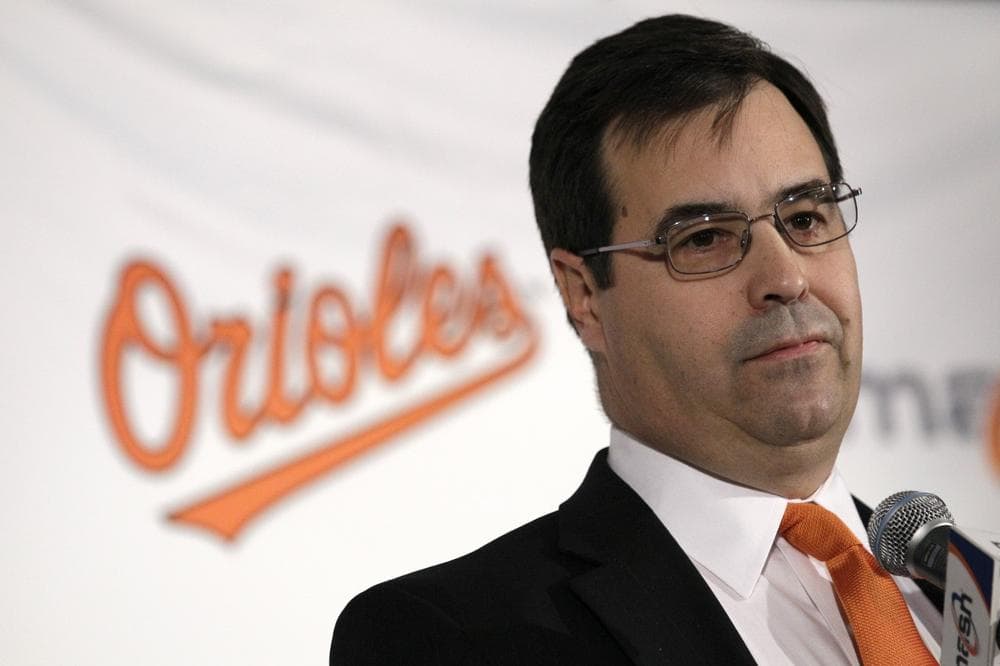Advertisement
In the news
Amherst College Builds Pipeline To MLB Front Offices
Resume
Twenty-five percent of the eight teams that qualified for the divisional round of Major League Baseball’s playoffs this year are run by general managers who are alumni of a tiny college in Western Massachusetts. Another heads a team that was in the playoff hunt until late in the season. How did Amherst College, a liberal arts school with a student body of about 1,800, become a pipeline to MLB front offices? Joining me now is an Amherst graduate who should have the answer: Baltimore Orioles General Manager, and a member of Amherst's class of 1980, Dan Duquette.
BL: Dan, in addition to you and Neal Huntington of the Pittsburgh Pirates, Boston Red Sox General manager Ben Cherington also graduated from Amherst. What’s in the water in Western Massachusetts?
DD: Well, you know, Neal and Ben and myself grew up [in New England, which] has a lot to do with it because it’s important to the people and the culture – the baseball team that they have in New England. Of course, we all went to Amherst, and I got my start from Harry Dalton, a 1950 graduate of Amherst College. Of course, we all played for Bill Thurston, the terrific coach there for 45 years. And he gave us a lot of knowledge and a great foundation, and he also recommended each of us to his contacts in professional baseball.
BL: I worked hard to find a Williams [College] connection for this story because it’s not really quite fair to exclusively celebrate Amherst. And, in fact, Bob Nutting, the owner of the Pittsburgh Pirates is a Williams graduate. Is there any ribbing that goes on in the little network there?
[sidebar title="Amherst vs. Williams" width="360" align="right"]In 2009, Amherst and Williams celebrated the 150th anniversary of the first intercollegiate baseball game.[/sidebar]DD: You know there is another tie to Williams College, of course: George Steinbrenner is a Williams graduate, and so is his son Hal, who’s running the Yankees now. So for years and years I bet George on the football game between Amherst and Williams, and I owed him 20 bucks like seven years in a row, and then when Amherst started winning, you know, George stopped betting me.
But anyway, I know Bob, he always likes to, you know, make it clear that he has an Amherst guy working for him, and he seems to enjoy that. So you know there has been a long pipeline of Amherst [grads], but Williams has a lot to talk about too, of course, with Mr. Steinbrenner and Mr. Nutting.
BL: Is it tempting for you to root for teams run by fellow Amherst alumni? And sort of along that line, were you disappointed when the Pirates were eliminated on Wednesday?
DD: I thought that Pirates team was a great story, and Neal did a great job there, and he has on his staff another Amherst grad, David Jauss, who was captain of the baseball team when I was there. And David’s been working with Neal for a couple years, and he was one of the coaches that assisted [Pirates manager] Clint Hurdle in the dugout.
But I thought that was a great example of building a team from the ground up and what a great accomplishment for Neal to turn that team around after 20 years and get them to the playoffs. You know, unfortunately they didn’t have the Adam Wainwright-type pitcher.
BL: Few do.
DD: I know, who does, right? But I thought that was a great testament to building a team through the farm system in a small market. And Neal had a great year and deserves a lot of credit. And they should be able to sustain that because they have a good, solid player-development operation.
BL: The Red Sox, meanwhile, your employer from 1994 to 2002 are four wins away from making it to their third World Series in nine years. I assume you’re rooting, at least on some level, for fellow Amherst alum Ben Cherington.
DD: Well, exactly, and Ben deserves a lot of credit. He came up through the Red Sox system. He learned his job and really restructured the team with that one huge trade he made last year with the Dodgers and gave himself the flexibility to rebuild that Red Sox team. And for them to go from worst to first this year he deserves a lot of the credit.
He brought in a good manager in John Farrell. He hired an outstanding pitching coach in Juan Nieves and got a good hitting coach there in Greg Colbrunn. And then he went about staffing the team with what he needed, systematically, and they’ve continue to get better as the year’s gone on. I hope Neal or Ben is the Major League Baseball Executive of the Year this year.
BL: Boy, what a great World Series story that would provide: Red Sox East vs. Red Sox West?
DD: Yeah, that would be a great story, and that trade really turned around the fortunes of both teams. If you take a look at what they did from the date of that trade to today you’ll see a strong correlation there.
BL: The Orioles had a great regular season – just missed the playoffs. What will your offseason approach be to getting the O's back into the postseason?
DD: We’ve got to do a little bit better job with our pitching staff. Our starting pitching still needs some depth and quality to it. And then we’re also going to need a couple of left-handed hitters to get on base.... We’ve got to follow the Red Sox model of getting on base actually.
This segment aired on October 12, 2013.